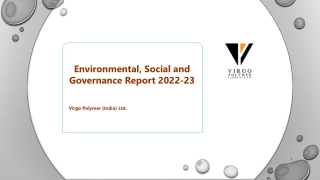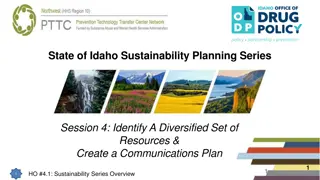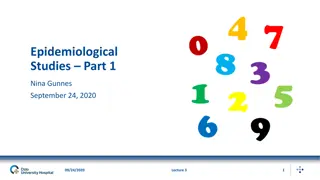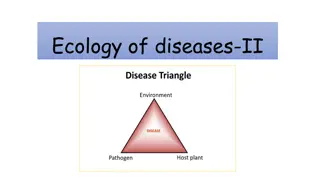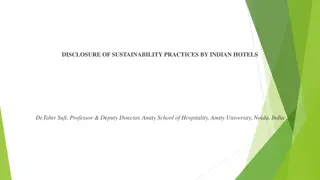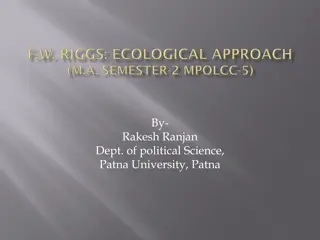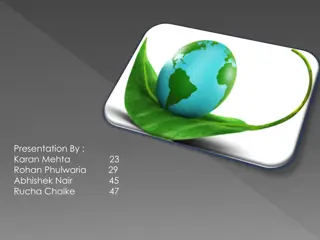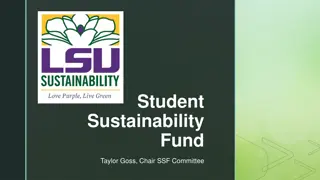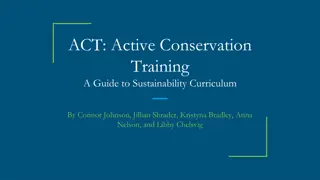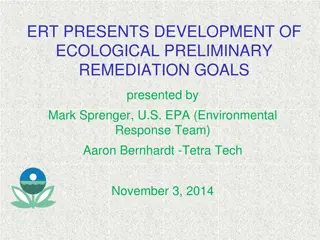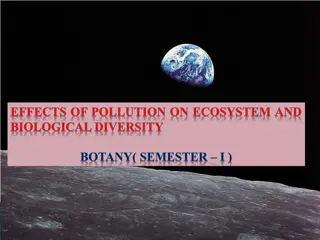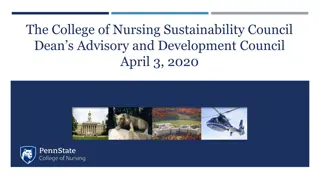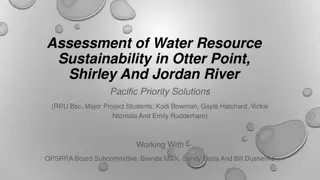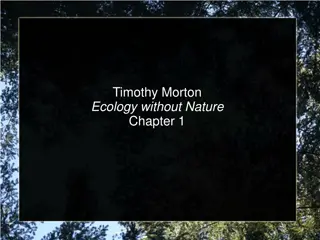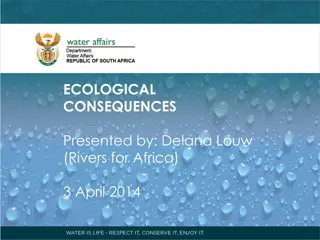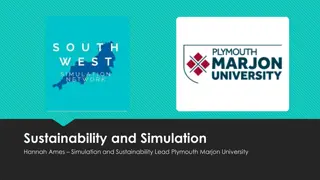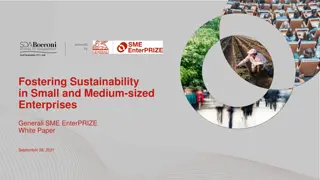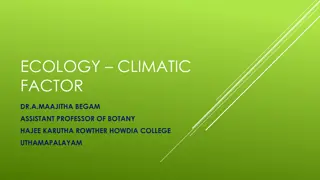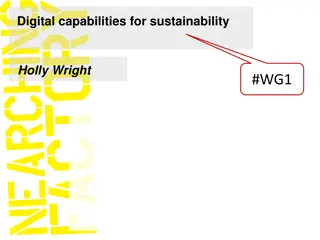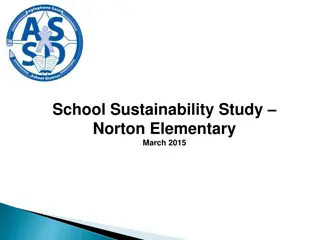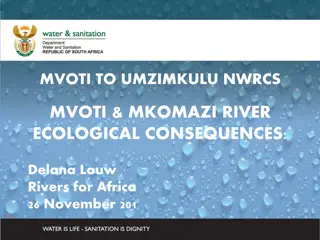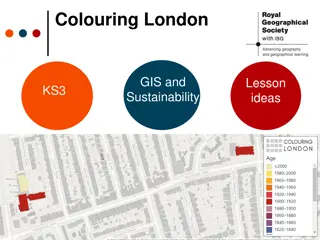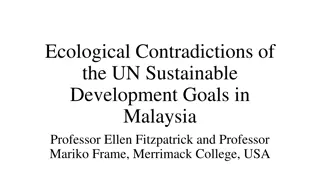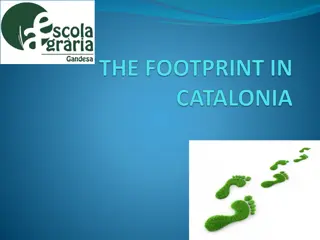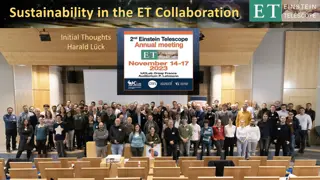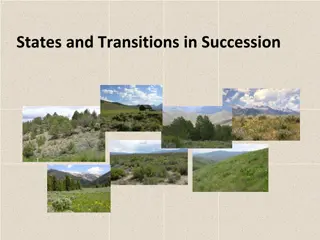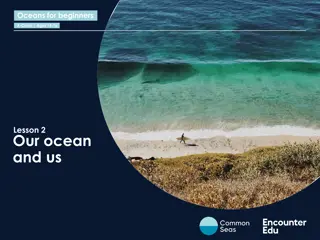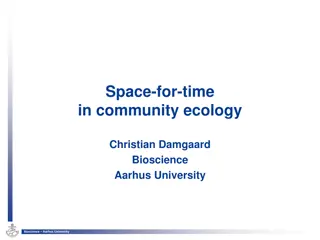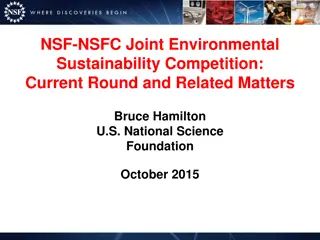Virgo Polymer (India) Ltd. ESG Report 2022-23: Sustainability Commitment & Strategic Management
Virgo Polymer (India) Ltd. presents its inaugural Environmental, Social, and Governance (ESG) Report for 2022-23, showcasing a steadfast dedication to sustainability principles. Covering practices, governance, and sustainability initiatives from April 1, 2022, to March 31, 2023, the report details t
0 views • 30 slides
Achieving Environmental Sustainability in Australian Universities: NTEU's Campaign and Successes
NTEU's campaign for environmental sustainability in Australian universities has led to significant achievements, with 26 out of 38 universities making sustainability claims. The successful integration of sustainability clauses in bargaining agreements reflects the commitment to environmentally susta
5 views • 17 slides
Libraries, Sustainability, and the UN Sustainable Development Goals
Sustainability in libraries plays a crucial role in promoting inclusive development for current and future generations. Access to information is highlighted as a human right essential for decision-making in favor of sustainability. Meaningful access to information requires connectivity, equality, sk
4 views • 47 slides
Importance of Integrating Sustainability Reporting in Government Accounting
Sustainability reporting in government accounting in Africa promotes transparency, supports Sustainable Development Goals, attracts investments, manages resources, enhances efficiency, and fosters partnerships. The role of government accounting is crucial for transparent and sustainable governance t
3 views • 9 slides
Transparency in Financial Markets: EU Taxonomy, SFDR, and Sustainability Reports Overview
This content discusses the importance of transparency in financial markets through the interplay of EU Taxonomy Regulation, SFDR, and sustainability reports. It emphasizes the objective of enforcing sustainability information to enhance investor decision-making processes and market confidence. The E
11 views • 10 slides
Understanding Voluntary Sustainability Schemes: ISCC and REDcert
Explore the principles and methods of Voluntary Sustainability Schemes (VS) such as ISCC and REDcert, focusing on mass balancing to implement and document sustainability measures. Learn how these methods can support sustainability claims and bio-content initiatives. Gain insights from Maja Henriksen
3 views • 17 slides
Sustainability Teaching Workshop in Higher Education
Welcome to the Sustainability Teaching Workshop where faculty across campus gather to integrate sustainability into course syllabi, create a community interested in sustainability, and learn about SUST course designation. Explore opportunities to engage with UN Sustainable Development Goals and enha
1 views • 22 slides
State of Idaho Sustainability Planning Series
Explore the State of Idaho Sustainability Planning Series Session 4, focusing on building a Sustainability Committee, creating a Communications Plan, and identifying a varied set of resources to support sustainability goals. Learn about engaging stakeholders and developing funding strategies for a s
0 views • 44 slides
Update on Sustainable Procurement in UN and WIPO Context
This update focuses on sustainable procurement within the UN and WIPO context. It discusses the evolution of sustainable procurement practices, including the integration of environmental and social sustainability pillars. The document highlights key milestones, such as the UN's definition of sustain
2 views • 11 slides
Overview of Ecological Studies in Epidemiology
Ecological studies in epidemiology involve studying groups of individuals at a population level to examine the correlation between exposure and disease occurrence. While cost-effective and useful for generating hypotheses, ecological studies have limitations, such as the inability to control for con
3 views • 21 slides
Understanding Ecosystems and Disease Ecology
Explore the diverse types of ecosystems, including autochthonous, anthropurgic, and synanthropic ecosystems, and their impact on disease ecology. Learn about biotopes, biocenosis, ecological mosaics, and ecological interfaces, and discover how infectious diseases can be transmitted across these inte
0 views • 10 slides
Sustainability Practices in Indian Hotels: A Website Analysis
This study explores the level of commitment of five and four-star hotels in India towards sustainability practices by analyzing their websites. It examines if hotels provide information on sustainability practices, have a sustainability management plan accessible to outsiders, and incorporate enviro
1 views • 14 slides
The Ecological Approach in Comparative Public Administration
Fred W. Riggs, a proponent of the Ecological Approach in Public Administration, emphasized the importance of understanding the interaction between administrative systems and their external surroundings. He introduced the Fused-Prismatic-Diffracted Model to explore the unique contexts of developing c
0 views • 21 slides
Understanding the Relationship Between Ecology and Business
Ecology and business have a complex relationship where human activities impact the ecological environment, and in turn, the environment influences our quality of life. Maintaining ecological balance is crucial for sustainable development, and businesses play a significant role in ensuring environmen
0 views • 19 slides
Student Sustainability Fund's Initiative for Environmental Responsibility
Student Sustainability Fund at LSU aims to foster sustainable projects, incorporate eco-friendly practices campus-wide, and protect natural resources for future generations. The fund supports proposals related to sustainability, encouraging collaboration and innovation. To submit a proposal, follow
0 views • 8 slides
Interactive Sustainability Curriculum for Conservation Training
Engage students in activities focusing on energy, agriculture, waste management, animals and ecosystems, consumption, and other sustainability topics. Lessons include understanding energy sources, land degradation, waste sorting, nature walks, tote bag making, and ecological footprints. Encourage cr
0 views • 7 slides
Eco-Remediation Goals Development Training Overview
This presentation by Mark Sprenger from the U.S. EPA discusses the development of Ecological Preliminary Remediation Goals (PRGs). It covers the process steps, assumptions, risk information activities, and resources related to ecological risk assessment within the EPA's programs. The training module
0 views • 53 slides
Enhancing Ecological Sustainability through Gamified Machine Learning
Improving human-computer interactions with gamification can help understand ecological sustainability better by parameterizing complex models. Allometric Trophic Network models analyze energy flow and biomass dynamics, but face challenges in parameterization. The Convergence Game in World of Balance
0 views • 12 slides
Understanding Biological Diversity and Ecological Organization
Exploring the intricate balance of flora and fauna on our planet, this content delves into the vast array of plant and animal species coexisting in various ecosystems. It discusses the significance of biodiversity, the interaction of biotic and abiotic components in ecological systems, and the ecolo
0 views • 41 slides
College of Nursing Sustainability Council Initiatives
The College of Nursing Sustainability Council, along with faculty and student members, is actively involved in promoting sustainability initiatives in the curriculum and service projects. They focus on integrating sustainability into the undergraduate curriculum, developing new courses, and funding
0 views • 11 slides
Assessment of Water Resource Sustainability in Otter Point, Shirley, and Jordan River
This project focuses on creating a GIS map and central database to evaluate water resource sustainability in Otter Point, Shirley, and Jordan River communities. The objectives include identifying information gaps, barriers to water sustainability, aquifer studies, and assessing the new Water Sustain
0 views • 4 slides
Rethinking Ecology: Nature's Role in Human Society
Timothy Morton's "Ecology without Nature" challenges the traditional concept of "nature" and its interference with ecological progress in society. Through thought-provoking narratives and philosophical perspectives, Morton argues for a reevaluation of our relationship with the environment, emphasizi
3 views • 23 slides
Elite Sport Sustainability: Balancing Acceleration and Deceleration
Exploring the sustainability of elite sports as a social subsystem, this research delves into conditions for enhancing individual and social well-being through sports. The study aims to interpret sustainability in the fast-paced world of elite sports and its impact on community welfare. By analyzing
0 views • 14 slides
Understanding Ecological Consequences in Ecosystem Management
Delana Louw from Rivers for Africa presented on the ecological consequences of various scenarios in ecosystem management. The process involves delineating units of analysis, stakeholder engagement, quantifying ecological water requirements, evaluating scenarios, and determining management classes. B
0 views • 14 slides
Sustainability in Healthcare Education: Moving Towards a Greener Future
Addressing the urgent need for sustainability in healthcare, this presentation highlights the role of simulation in educating healthcare professionals about climate change and its impact on patient care. It emphasizes the importance of sustainability research and offers strategies such as developing
0 views • 6 slides
Empowering European SMEs for Sustainable Transition: Insights from Generali SME EnterPRIZE White Paper
European SMEs play a crucial role in the EU Sustainable Agenda. The Generali SME EnterPRIZE White Paper focuses on analyzing the sustainability approach of European SMEs, identifying barriers, and mapping drivers for their sustainable transition. The strategic importance of sustainability for SMEs i
1 views • 5 slides
Ecological Factors and Climatic Influences on Plant Life
Ecological factors play a crucial role in shaping the environment for organisms to thrive. This includes living (biotic) and non-living (abiotic) components like climatic factors, edaphic factors, topographic factors, and biotic factors. Climatic factors such as light, temperature, water, wind, and
0 views • 14 slides
Digital Capabilities for Sustainability with Holly Wright
Explore the digital capabilities for sustainability through various topics such as archaeology, open data movement, crowdsourcing, citizen science, digital preservation, knowledge creation, and imagination. Engage in discussions on challenges to sustainability, promoting sustainability, and envision
0 views • 5 slides
The Integral Role of Sustainability in Airport Capacity-Enhancing Projects
Sustainability plays a crucial role in airport capacity enhancement by providing numerous benefits such as cost savings, good relations with neighbors, efficient operations, employee satisfaction, and balancing competing interests. By integrating sustainability into projects like new runways, termin
0 views • 10 slides
School Sustainability Study at Norton Elementary - March 2015
The Anglophone South District Education Council is conducting a School Sustainability Study at Norton Elementary School in accordance with Provincial Policy 409. Public consultations will be held to gather input and feedback from the community regarding the sustainability of the school. The process
0 views • 28 slides
IMP.ROVE Corporate Sustainability Navigator: Drive Sustainable Growth
Explore the IMP.ROVE Corporate Sustainability Navigator tool to assess your company's sustainability practices, identify areas for improvement, and drive growth through innovation. Benefit from personalized benchmarking reports, ongoing support, and insights into untapped potentials. Jointly define
0 views • 6 slides
Ecological Consequences Assessment for Conservation Areas
Determining the ecological consequences of various scenarios is crucial for conservation efforts. The assessment focuses on changes in geomorphology, physico-chemical properties, fish populations, macroinvertebrates, and riparian vegetation. By evaluating scenarios based on ecological significance,
0 views • 11 slides
GIS and Sustainability Lesson Ideas for KS3 on Colouring London
Explore how Colouring London aims to make the city more sustainable by collecting information on every building. Engage students in discussions about sustainability, data collection, and use of GIS for mapping sustainability. Encourage hands-on fieldwork and online research to gather primary and sec
0 views • 24 slides
Ecological Contradictions of UN Sustainable Development Goals in Malaysia
This study conducted by Professors Ellen Fitzpatrick and Mariko Frame from Merrimack College, USA, examines the potential conflicts between economic objectives and environmental sustainability goals within the UN Sustainable Development Goals framework, using Malaysia as a case study. It delves into
0 views • 15 slides
Understanding Ecological Footprint: A Vital Sustainability Indicator
The ecological footprint measures the productive land and sea surfaces needed to support a country's resource consumption and waste generation. It informs the surface area required to renew resources used and emphasizes the importance of sustainable practices for a balanced ecosystem.
0 views • 24 slides
Sustainability Challenges in ET Collaboration: Addressing Ecological and Non-Ecological Aspects
The ET Collaboration is realizing the importance of sustainability, encompassing ecological and non-ecological aspects. Issues include balancing energy consumption and hardware longevity, remote access possibilities, funding sustainability, social partnerships, and designing instruments with sustain
0 views • 5 slides
Understanding Plant Community Succession and Ecological Transitions
Explore the dynamic process of plant community succession, from pioneer stages to climax communities, and the intricate patterns of transitions in ecological systems. Discover the variability and stability of different states within ecosystems, highlighting the complexities of natural ecological dyn
0 views • 14 slides
Understanding Ecological Goods and Services from Our Oceans
Explore the importance of ecological goods and services provided by oceans in Lesson 2 of the Oceans for Beginners curriculum. Learn about the tangible products, benefits, and services derived from ocean ecosystems, and reflect on their significance. Understand the categories of ecological services
0 views • 15 slides
Understanding Space-for-Time Substitution in Community Ecology
Space-for-time substitution (SFT) is a method used to study slow ecological processes by assuming different sites are at various stages of development. This approach, famous for its role in ecological development, has been critiqued for its implicit use in testing hypotheses on ecological processes
0 views • 7 slides
Opportunities in Environmental Sustainability Competitions
The NSF-NSFC Joint Environmental Sustainability Competition focuses on topics like combustion related to sustainable energy and urban water sustainability. The current round includes deadlines and grant details. Additionally, NSF is involved in various related programs and has announced new Sustaina
0 views • 12 slides
